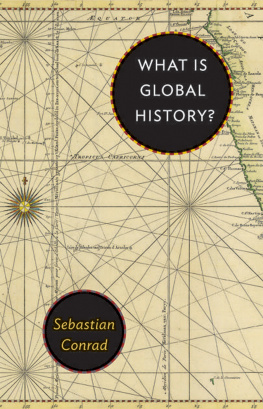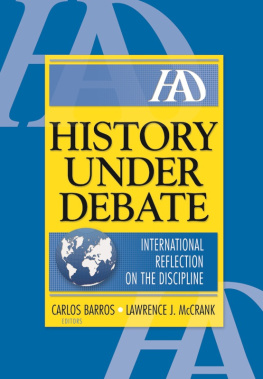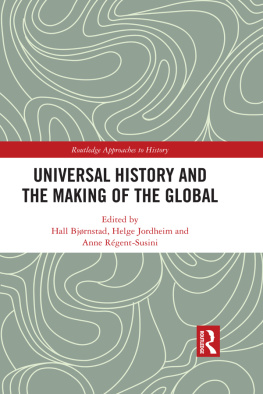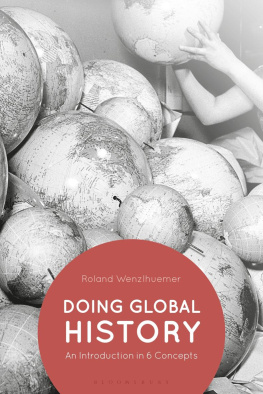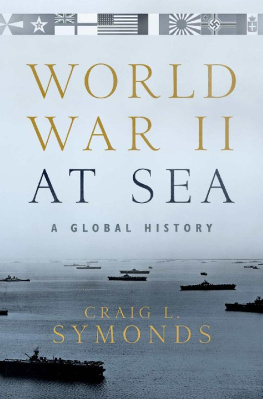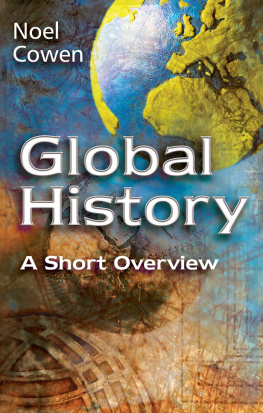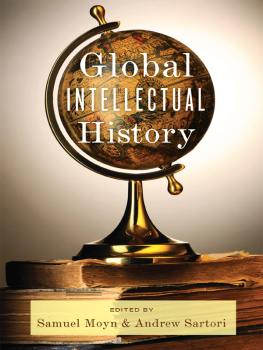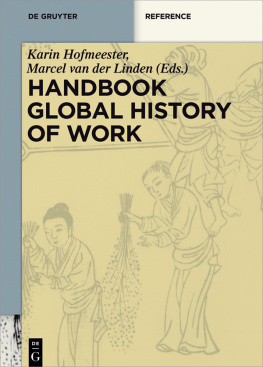
What Is Global History?

What Is Global History?

SEBASTIAN CONRAD
PRINCETON UNIVERSITY PRESS
Princeton and Oxford
Copyright 2016 by Princeton University Press
Published by Princeton University Press, 41 William Street,
Princeton, New Jersey 08540
In the United Kingdom: Princeton University Press, 6 Oxford Street,
Woodstock, Oxfordshire OX20 1TW
press.princeton.edu
Jacket art: 1746 Carte de LOcean
Meridional Dresse pour Servir a lHistoire
Generale des Voyages, Bellin / Van Schley
Map courtesy of Harlan J. Berk, Ltd.
All Rights Reserved
ISBN 978-0-691-15525-8
Library of Congress Control Number 2015953087
British Library Cataloging-in-Publication Data is available
This book has been composed in Garamond and Ideal
Printed on acid-free paper.
Printed in the United States of America
1 3 5 7 9 10 8 6 4 2
Contents

What Is Global History?

CHAPTER 1
Introduction

All historians are world historians now, C. A. Bayly has declared, somewhat provocativelyonly to add, though many have not yet realized it. Indeed, there can be no doubt that global/world history is currently booming. In the United States, and in the other parts of the Anglophone world, it has for several decades been the fastest-growing field within the discipline. This trend has also caught on in parts of Europe and East Asia, where global history is on the rise and finding increasing favor with a younger generation of historians. Journals and conventions are appearing everywhere, and in many settings global dimensions have become an almost obligatory feature of successful project proposals. But does this rise in popularity really mean that every historian is a global historian? Just what is it about global history that has made it so popular? And why is this happening now?
There are many reasons for this boom. Most significant has been the increased interest in global processes that followed first the end of the Cold War and then the events of September 11, 2001. Given the widespread fashion for seeing globalization as the key to understanding the present, the need to go back in time and explore the historical origins of this process
The communication revolution that began in the 1990s also has had an important impact on our interpretations of the past. Historiansand their readerstravel and experience more of the world than ever before. This increased mobility, further enhanced by the Internet, has facilitated networking and made it possible for historians to participate in global forumsthough, admittedly, voices from formerly colonized countries are often barely discernible. As a result, historians today are dealing with a large number of competing narratives, and they see the potential for new insights precisely in this diversity of voices. Finally, the network logic that computer technology encourages has affected the thinking of historians, who increasingly employ a language of networks and nodal points to replace older territorial logics. Writing history in the twenty-first century is not what it used to be.
Why global history? Beyond Internalism and Eurocentrism
Global history was born out of a conviction that the tools historians had been using to analyze the past were no longer sufficient. Globalization has posed a fundamental challenge to the social sciences and to the dominant narratives of social change. Entanglements and networks characterize the present moment, which has itself emerged from systems of interaction and exchange. But in many respects, the social sciences are no longer adequately able to pose the right questions and generate answers that help to explain the realities of a networked and globalized world.
In particular, two birth defects of the modern social sciences and humanities hinder our ability to achieve a systematic grasp of processes that span the world. Both can be traced to the formation of the modern academic disciplines in nineteenth-century Europe. First, the genesis of the social sciences and humanities was tied to the nation-state. In their themes and questions, and even in their societal function, fields like history, sociology, and philology remained tied to a countrys own society. Beyond that, the methodological nationalism of the academic disciplines meant that, theoretically, the nation-state was presupposed as the fundamental unit of investigation, a territorial entity that served as a container for a society. The commitment to territorially bounded containers was more pronounced in the field of history than in some of its neighboring disciplines. Knowledge of the world was thereby discursively and institutionally prestructured in such a way as to obscure the role of exchange relationships. History, in most quarters, was limited to national history.
Global history is one attempt to face the challenges posed by these observations, and to overcome the two unfortunate birthmarks of the modern disciplines. It is thus a revisionist approacheven if it builds on a whole series of forerunners, for issues such as migration, colonialism, and trade have long been of concern to historians. An interest in examining cross-border phenomena may not in itself be new, but now it stakes a new claim. It means to change the terrain on which historians think. Global history, therefore, has a polemical dimension. It constitutes an assault on many forms of container-based paradigms, chief among them national history. As we will discuss in more detail in , it is a corrective to internalist, or genealogical, versions of historical thinking that try to explain historical change from within.
At the same time, and beyond issues of method, global history aims to effect a change in the organization and institutional order of knowledge. In many countries, what is called history was long equated in practice with each countrys own national history: most Italian historians worked on Italy, most of their Korean colleagues studied Koreavirtually everywhere, generations of students were introduced to history through handbooks narrating the national past. Against this background, the call for global history comes as a call for inclusiveness, for a broader vision. Other pasts were history, too.
And even where history faculties are well staffed and prepared for broader coverage, courses tend to present the histories of nations and civilizations as monads, in isolation. Chinese textbooks on world history, for example, categorically exclude Chinafor the national past is taught in a different department. The compartmentalization of historical realityinto national and world history, into history and area studiesmeans that parallels and entanglements cannot come into focus. The case for global history is thus also a plea to overcome such fragmentation, and to arrive at a more comprehensive understanding of the interactions and connections that have made the modern world.
Global history is certainly not the only game in town, nor is it fundamentally superior as an approach. It is one approach among many, and it is better suited to addressing some questions and issues and less appropriate for addressing others. Its core concerns are with mobility and exchange, with processes that transcend borders and boundaries. It takes the interconnected world as its point of departure, and the circulation and exchange of things, people, ideas, and institutions are among its key subjects.
Next page
